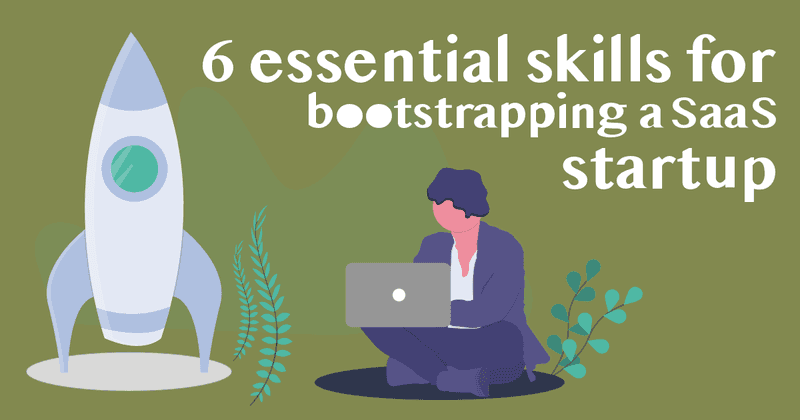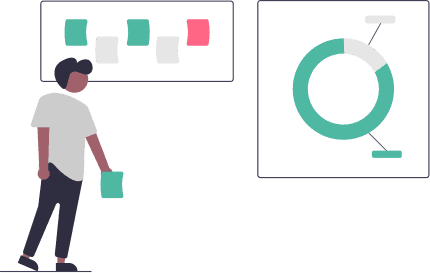6 essential skills for bootstrapping a SaaS startup
There are many ways to create a company but the two most prominent are Bootstrapped or Angel/VC funded. I will focus on the bootstrapped a.k.a. "I will do it all myself" variant. The other one mentioned, normally has at least two founders and sometimes even in very early stages, enough money to instantly hire people, so that the skill set can be spread out to various people.
This is a luxury Solopreneurs bootstrapping a company don't have. They must do it all and they shouldn't have too many blind spots. The following list represents my personal experiences when it comes to the skills needed. The list is sorted by priority. As a bonus I will mention a lot of sites and products to get you up and running quickly.
1. Superb Software / Product Development Skills
This one is obvious when it comes to creating a business in the software-as-a-service space. You should be able not only to hammer in code but also know what it takes to deliver a real product. So it's more than just features. Have you ever thought about the best way to create documentation for your product? Are you aware of the various hosting options? Do you know the key players for cloud infrastructure? Have you thought about the build pipeline? What's the best way to store your data? How do you keep infrastructure costs at a minimum while you are not making any money? It's not so much about the programming language, even though all your nerd friends will tell you otherwise. You can create a great product with nearly every popular language out there.
[[info | My Advice!]] | Use your favorite tech stack and create a product people would pay for. Sounds easy but it's not of course. Early on, think about SaaS related challenges like payment (there you have services like Stripe or Chargebee), how to manage plans with a freemium model, how to manage user credentials and how to create multi-tennant environments with a strong emphasis on security. Cloud providers like Google Cloud, AWS or Microsoft Azure are the one-stop providers in that space. Of course, you can handpick your providers based on the actual problem but i would start with using one platform and create your services there as long as possible. More service providers -> more headache.
2. Content Production Skills
Later in this article, I will explain in more detail why you need content and how you put it out in the wild. But before you can do that, you should be able to handle some more programs to effectively be able to create any content at all.
- be able to shoot video footage
- be able to do post-production of video footage with the help of programs like Davinci Resolve or some more entry level ones
- be able to write articles / blog posts
- be able to handle pixel/vector editing programs like Sketch and Photoshop
- know where to find ready-made resources (stock photos, background music, whatever) - see #4
[[info | My Advice!]] | Start writing blog articles on Medium or any other ready-to-use blogging portal and get a feeling for it. Try to create YouTube videos with any video recording hardware you get your hands on. Even a phone with a tripod adapter will do it. If you get more experienced, you will upgrade your hardware to a mirrorless camera with great video capabilities anyway. Watch YouTube videos how to vblog. There you will get many recommendations for hardware and software.
3. Legal Entity / Company Structure Know-How
You should be aware of the various options when it comes to creating the legal entity for your business. In most countries you have many options, all with their own sets of advantages and disadvantages. Some people chose not to create a company at all and do the project on their private account while it's being young. I strongly advise against that. Even new projects can face legal issues like trademark wrongdoings, data protection law problems or similar things. You really don't want to fight through this while being held privately accountable. As a side note, as a German citizen, I can guarantee you, that obeying the German data protection law alone is not something to be taken lightly.
There are also companies helping you creating the legal entity without too much hassle. In germany companies like firma.de help you with a web based process. They charge you not too much and it's so much more pleasant than doing the official paperwork, searching for lawyers, visiting the local authorities all yourself. Time is better spent on developing your product.
[[info | My Advice!]] | Don't start a project without creating a legal entity. Of course, you can start coding on a project in stealth mode without a company, but as soon you have an online presence or market your offering in any way. Create a company for it.
4. Web-Development / Design Skills
If you are good in #1 and have a track record in developing web based software, you should be ready technically to code HTML5 and CSS to achieve this goal. Unfortunately it's more than that. You should have a good understanding how to implement tracking software, decide to use tools like Google Tag Manager and know the overall tooling landscape for websites. You should know what A/B testing means, be aware of tools like mouse-tracking software to understand your visitors better and all those little things to optimize the code of your website. Most likely you want to have a CMS on your site to create content without modifying HTML code each time you put out an article. I will come back to this in #6.
The second part of the headline is more difficult, especially when you are heavily technology driven. I don't recommend starting with a white canvas and do the whole design yourself because this will cost a lot of time and if you are not a unicorn which can program and design at the same time on a high level, it will most likely look ugly. Chances are high that you are also not a professional illustrator, so be aware of sites like undraw.co or drawkit.io. They have great illustrations as a starting point. If you need free stock photos, watch out for sites like unsplash.com or pexels.com.
[[info | My advice!]] | Better buy a ready-made HTML template on sites like themeforest.net and customize it. It's so much quicker and chances are high that it will look better too. The costs are really negligible. Do the same with illustrations. Use the sites I mentioned and just mix and match various elements to create unique and new illustrations. It's far easier to compose new illustrations out of existing ones. I really would never be able to draw a human being from scratch by hand with Sketch but I can easily change the looks of an existing one.
5. Market / Competitor Knowledge
Your product is most likely in a defined market space, filled with competitors. You should know them and know their offerings and even more important, know their pricing. On top of that, you want to check out how they market themselves online. SEO tools like Semrush for instance helps you analyze that. You can see what kind of Google Ads they run and how their backlinks are structured. Furthermore, you see what kind of keywords they target and their rankings.
[[info | My Advice!]] | Use google to find your direct competitors and check their websites to get an overall idea of their products and pricing. If you have done that, use the companies you have researched and feed SEO tools which have a Competition-Analyze feature to get even more insights to the competitors.
6. Digital Marketing / SEO Skills
You need to promote your product or services and the best way to do it in the early days without a big (or any) marketing budget is to focus on online / digital marketing. This goes somewhat hand in hand with Search Engine Optimization (SEO) Skills to have a website that will get ranked well for certain keywords with Google. Organic hits are something you should focus early on. But what does that mean? Well, it means basically that you should read books about SEO. After that you have an idea how your website wording should look like. You know how to structure your content, your URLs, how to expose additional metadata to Google and you be aware of the different types of search engine results Google Search offers.
You most likely need tools to really corner SEO. There you have the option to use a lot of free tools which do exactly one thing quite ok or go with a big commercial package, which covers most SEO needs but comes with (for bootstrappers) a heafty price tag. I normally chose the all-in-one packages from vendors like Semrush. But even with such a tool you need to be aware of the must-have tools like Google Search Console or GTMetrix. And if you have not read a book about Google Analytics or any other analytics products, start now! You need to know what's going on your site and add custom events when doing "campaigns" or to measure your various funnels. This article can't cover even a fraction of the things you need to know in terms of digital marketing. I didn't even touched areas like content marketing. If you read this blog, my content marketing has worked.
[[info | My Advice!]] | There are tons of books about Marketing out there and i would chose one which focuses on SEO. Some of them also cover additional topics like content marketing. But it wont hurt if you read some more general Digital Marketing books too.
Summary
The greatest bootstrappers I know are of course Allrounders. If you are able to be in the top 25% of each area mentioned, chances are high that you don't fail but that's a tough call. It's hard to create good-looking vector based drawings, know how to develop software and at the same time being business savvy and shoot nice looking vblogs.
The key to all this is having fun doing it all and don't strive for perfection in any of those areas because it's simply not possible and that's ok. The goal is just not being a no-show in the key areas. When there is initial success, you will hire people and then fill those positions based on your biggest weaknesses.










